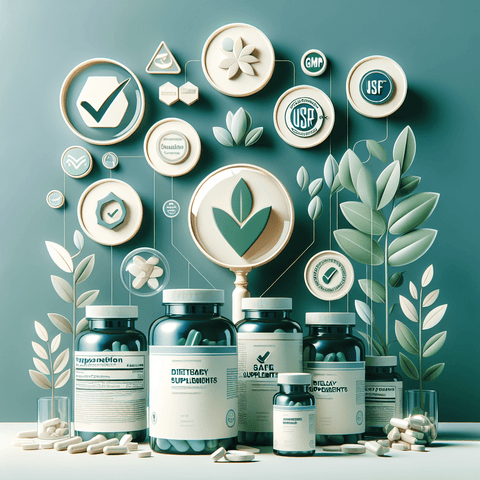Introduction
In today's health-conscious world, dietary supplements have become an integral part of many individuals' wellness routines. From supporting immune function to enhancing energy levels, supplements promise numerous health benefits that appeal to a broad demographic. However, along with their popularity comes a crucial responsibility for consumers: distinguishing between trustworthy, safe supplement brands and those that may pose risks to health. The supplement industry is largely unregulated compared to pharmaceuticals, which means that not all products on the market are created equal. Low-quality, contaminated, or mislabeled supplements can jeopardize health, cause adverse reactions, or simply waste money. Therefore, making informed choices is essential.
This comprehensive guide aims to equip you with the necessary tools and knowledge to identify reliable and safe supplement brands. We will explore the qualities that define trustworthy manufacturers, delve into the importance of verified manufacturing processes and certifications, analyze how to interpret supplement labels, and offer practical tips for sourcing supplements from reputable vendors. By the end of this post, you will have a clear understanding of how to confidently select dietary supplements that support your health and safety, empowering you to be a savvy consumer in an often complex marketplace.
Trustworthy Supplement Brands in the Nutritional Supplement Industry
Trust in a supplement brand hinges on transparency, reputation, quality assurance, and consumer feedback. A reputable brand invests in rigorous quality control practices, conducts or supports scientific research, and maintains open communication about its manufacturing processes. When assessing supplement brands, one of the primary indicators of trustworthiness is their commitment to transparency. Do they openly provide detailed ingredient lists, manufacturing locations, and third-party testing results? Are their claims supported by scientific evidence or peer-reviewed studies?
Reliable brands also prioritize consumer safety by adhering to high manufacturing standards. For instance, they might have certifications such as Good Manufacturing Practice (GMP), which is essential for ensuring product quality and consistency. Other qualities include transparency in sourcing ingredients, clarity in dosing, and honest marketing without exaggerated claims. Reputable companies often have strong reputations backed by positive customer reviews, awards, and industry endorsements, fostering confidence among consumers.
Some well-known trustworthy brands in the industry include Nature’s Way, Thorne Research, and NOW Foods. These companies have established themselves over years through consistent quality, transparency, and adherence to regulatory standards. However, even lesser-known brands can be trustworthy if they meet the key qualities discussed. Ultimately, a combination of transparency, verification, and consumer feedback helps determine whether a supplement brand can be trusted.
Verified Supplement Manufacturers: Ensuring Authenticity and Safety
The backbone of a safe supplement is a verified manufacturing process. Verification ensures that the product has undergone stringent quality control measures, adheres to safety standards, and meets regulatory requirements. Certifications from third-party organizations serve as proof of these standards. The most recognized certifications include Good Manufacturing Practice (GMP), NSF International, and the United States Pharmacopeia (USP).
GMP certification, for example, indicates that the manufacturer complies with specific quality standards concerning manufacturing processes, quality control, and personnel training. NSF International offers standards for safety and quality, testing supplements for contaminants and verifying ingredient authenticity. USP verification involves rigorous testing to confirm label accuracy, purity, potency, and performance. These certifications act as industry benchmarks, ensuring that the products are free from harmful contaminants and contain what they claim.
Before purchasing a supplement, verify the manufacturer's credentials by checking their certification statuses and third-party testing results. Many brands publish their GMP or NSF certificates on their websites, providing transparency and reassurance. Consumers can also look for batch-specific Certificates of Analysis (COA), which document contamination testing and ingredient purity. Taking these steps helps confirm that the supplement has been produced and tested under recognized safety standards, reducing risks associated with contamination or mislabeling.
Reputable Health Supplement Companies: Building Consumer Confidence
Reputable supplement companies distinguish themselves through their scientific backing, quality assurance, and accountability. These brands actively invest in research to substantiate the health claims associated with their products. Scientific validation involves clinical trials or peer-reviewed studies that support the efficacy of ingredients used. Such evidence-based approaches reinforce consumer confidence and demonstrate a commitment to safety rather than marketing hype.
Established companies tend to implement rigorous quality standards and are transparent about their sourcing and manufacturing processes. They often undergo regular third-party testing, publish detailed product information, and respond openly to consumer inquiries. Awards from industry organizations or positive reviews from independent health professionals further bolster their credibility.
For example, brands that have gained recognition for their integrity and quality often participate in industry certifications, sponsor scientific studies, and maintain active communication channels for consumers seeking information. When choosing a supplement, look for companies with a history of transparency, consistent quality, and positive reputation within the health community. These factors help ensure that the products you purchase are trustworthy and safe for daily use.
Safe Supplement Brand Reviews: Insights from Consumer and Expert Feedback
Authentic reviews and testimonials are invaluable resources for evaluating the safety and reliability of supplement brands. Honest reviews from other consumers provide real-world insights into product efficacy, taste, digestibility, and potential side effects. Expert opinions from healthcare professionals or nutritional experts can also offer a more nuanced assessment based on scientific understanding.
However, it is crucial to differentiate genuine reviews from fake or biased feedback. Look for detailed reviews that mention specific experiences, ingredient transparency, and whether the product met expectations. Be cautious of overly positive reviews without substance or those that seem overly promotional. Platforms such as trusted supplement review websites, health forums, and social media groups can provide diverse perspectives.
When analyzing reviews, check overall ratings and recurring themes—such as reports of adverse reactions or benefits. Brands with consistently high ratings and comments highlighting their transparency, safety, and effectiveness are more likely to be trustworthy. Also, consider reviews that mention third-party testing, clear labeling, and responsive customer service, as these are indicators of a brand's commitment to consumer safety.
Trusted Dietary Supplement Sources: Where to Find Reliable Products
The place of purchase significantly influences the safety and authenticity of dietary supplements. Always buy from authorized, reputable sources such as the manufacturer's official website or trusted health stores. These sources often carry the most current, verified stock and provide guarantees of authenticity.
Purchasing directly from a brand’s official site allows you to access full product information, certifications, and sometimes exclusive offers. Certified health stores and pharmacy chains also adhere to strict sourcing and quality assurance protocols. Buying from these vendors reduces the risk of encountering counterfeit or expired products.
Conversely, third-party marketplaces such as unverified online shops or street vendors increase the risk of counterfeit or substandard supplements. To identify trustworthy online and offline retail outlets, look for stores with industry certifications, clear return policies, and customer reviews. Additionally, avoid products with unclear labeling, missing batch information, or suspicious pricing. Educate yourself on the authorized sellers in your region, and always prioritize safety over cost savings.
Quality Assurance Supplement Labels: Decoding the Information for Safety
Supplement labels provide critical information necessary for evaluating safety and quality. Thoroughly review ingredient lists, serving sizes, warnings, and certifications. Ingredients should be clearly listed in descending order of weight, with precise quantities supporting safe consumption.
Recognized quality seals on supplement packaging—such as GMP, NSF, or USP—are indicators that the product meets specific safety and quality standards. Organic and Non-GMO certifications further suggest that sourcing practices meet certain environmental and safety criteria. Additionally, check for the expiration date and batch number, which ensure freshness and traceability.
Transparent labels reflect a brand's commitment to consumer safety. Look for comprehensive information, absence of proprietary blends that obscure ingredient quantities, and clear warnings or contraindications. Legible, detailed labels are essential for making informed decisions and ensuring you select products designed with safety and efficacy in mind.
Additional Tips for Selecting Safe and Reliable Supplements
Beyond certifications and labels, conducting personal research and consulting healthcare professionals can significantly enhance your decision-making process. Always consider your individual health conditions, medications, and nutritional needs before starting a new supplement regimen.
Avoid products with exaggerated health claims or aggressive marketing tactics. If a supplement promises miraculous results or cures specific ailments, approach with skepticism. Stay updated on regulatory changes and industry news—new certifications or warnings can impact the safety profile of certain products.
Pay attention to the sourcing of ingredients; transparent companies often disclose their suppliers and farming practices. Regularly review quality standards, manufacturing practices, and company reputations to stay informed and safe. Remember, prioritizing quality and transparency over price can prevent many adverse outcomes and foster trust in your health choices.
Conclusion
In summary, safeguarding your health through dietary supplements begins with informed selection. Trustworthy supplement brands distinguish themselves through transparency, credible certifications, scientific backing, and positive consumer feedback. Verifying manufacturing processes via organizations like GMP, NSF, and USP is essential to ensure safety and authenticity. Reading labels carefully and sourcing products from reputable vendors further reduce risks. Additionally, ongoing personal research and professional consultation are valuable tools for making confident, health-supportive choices.
By applying these strategies, you can make well-informed decisions that prioritize your safety and maximize the benefits of supplementation. Remember, your health is an investment—choose brands that demonstrate integrity, safety, and efficacy. Empower yourself as a knowledgeable consumer, and always advocate for transparency and high standards in the dietary supplement industry.
Q&A Section
Q1: Why is third-party testing important when choosing a supplement brand?
A1: Third-party testing provides an independent verification of a supplement’s quality, purity, potency, and safety. Certifications from organizations like NSF or USP ensure that the product contains what it claims without harmful contaminants, giving consumers added confidence.
Q2: What labels or certifications should I look for to ensure a supplement is safe?
A2: Look for labels such as GMP (Good Manufacturing Practice), NSF International, USP (United States Pharmacopeia), Organic, and Non-GMO. These certifications show adherence to industry safety and quality standards.
Q3: Can consumer reviews reliably determine a supplement brand’s safety?
A3: While reviews can provide helpful insights about efficacy and user experiences, they should be considered alongside certifications and transparent labeling. Honest, detailed reviews from verified buyers and reputable review platforms are more trustworthy sources.
Q4: Where is the safest place to buy supplements?
A4: The safest sources include the official brand websites, certified health retailers, and pharmacies. Avoid unverified third-party marketplaces that may sell counterfeit products.
Q5: How do I verify a supplement manufacturer's credentials?
A5: Check the brand’s website for certification badges, batch-specific Certificates of Analysis, and third-party testing results. Also, consult regulatory agencies or industry watchdogs for additional verification information.
Important Keywords
- trustworthy supplement brands
- supplement certifications
- GMP, NSF, USP
- verified manufacturing
- reliable supplement reviews
- supplement labels decoding
- safe supplement sources
- quality assurance supplements
- organic and Non-GMO certifications
- professional healthcare consultation
- Topvitamine supplement categories



